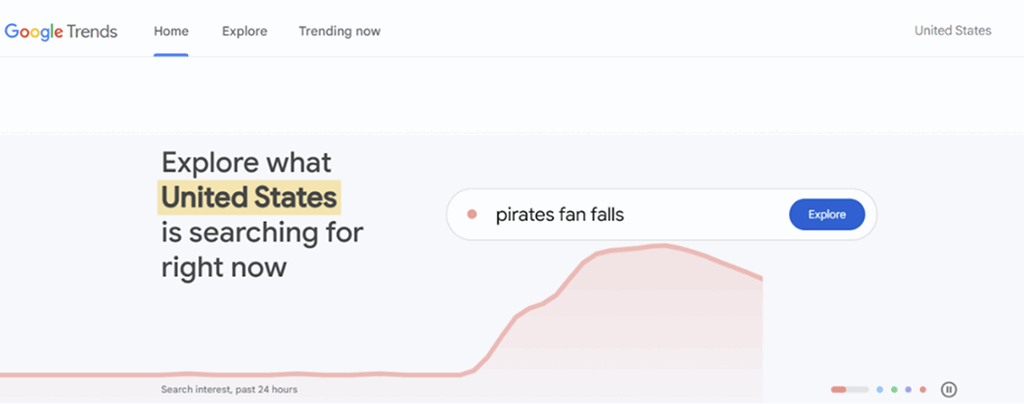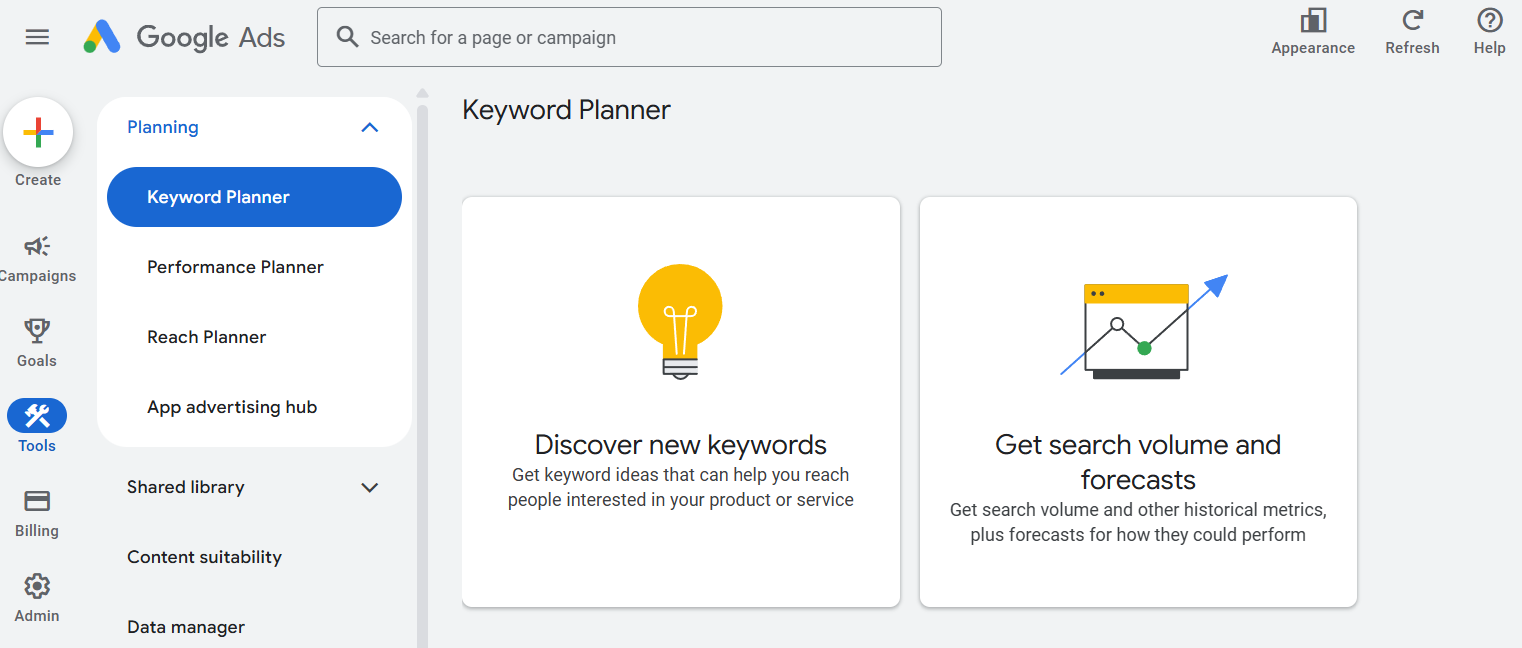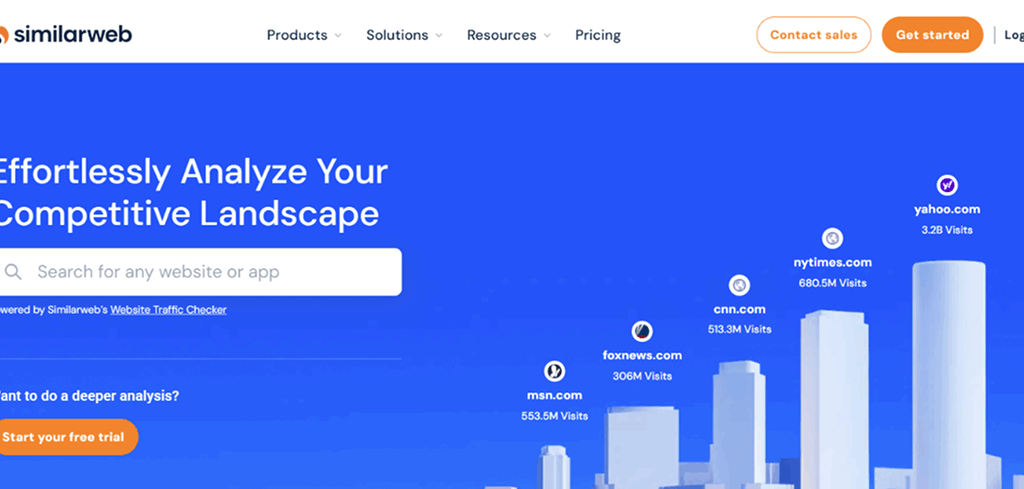Finding keywords for domain names is a primary goal for domain resellers and digital assets owners.
In the domain industry, building a strong digital presence is everything: while investors exploit several tactics to position their assets, a robust organic domain names.
As online trends evolve by the hour, tapping into popular search terms is one smart way to boost your visibility, stay relevant, and even capture new business opportunities before your competitors do.
For this, working on core SEO areas is the key to creating mid-to-long-term domain value.
Why should you consider trending keywords for domains?
When a domain reflects what people are actively searching for, it increases the chances of higher organic traffic, faster user trust, and stronger brand association.
More importantly, keyword-rich domains can also perform better in both organic results (natural searches that lead to your domain) and pay-per-click (PPC) campaigns, resulting in higher resale value on the aftermarket.
But not all trending terms are worth your time.
Choosing the right one means balancing short-term spikes with long-term relevance—and having the right tools and strategy to evaluate their domain potential.
Tools and techniques to identify trending keywords
Finding the right keywords for domain names is part of the SEO area identified as “on page” and it’s about evaluating a compound of factors and metrics.
For instance, different keywords have different volumes of search in specific geographical areas and estimated ranking difficulty scores.
These factors are just the tip of the iceberg, but ultimately, keyword-based domain names should correspond to users’ intents and search goals.
To evaluate these metrics and relate them to your strategic decision making, there are a variety of tools; some of them focus on specific aspects of the keywords realm, such as the competitive landscape for a specific niche, and can be expensive resources.Nonetheless, we can start by exploring the Google toolset, which provides a clear, free start to understanding the search panorama.

Google Trends is one of the most accessible tools for discovering real-time and historical keyword popularity.
You can compare search interest across regions, timeframes, and even related terms.
For domain purposes, pay attention to breakout terms—those with a rapid rise in volume—which often signal an emerging trend.
Combine this with localized filters to find opportunities within specific countries or regions.
Google Keyword planner
Google Keyword Planner is a free tool within Google Ads that helps you discover keyword ideas, search volumes, and competition levels.
To access it, create a Google Ads account (no ad spend required), navigate to “Tools & Settings,” then select “Keyword Planner.”

It’s a great starting point to evaluate if your trending keyword has strong commercial potential, and whether it’s worth turning into a domain.
Proprietary SEO tools to investigate keywords for domain names
Professional keyword tools allow you to dig deeper into search volume, keyword difficulty, and search intent from different perspectives.
Ahrefs is one of the most powerful SEO platforms that offers in-depth keyword analysis, backlink tracking, and competitive research. Its “Keywords Explorer” helps you find keyword ideas based on real search behavior and filter by metrics like difficulty and potential traffic.
Semrush combines keyword research with domain analytics, allowing users to analyze SERPs, discover trending queries, and track competitors’ strategies. It’s one of the most popular and complete tools in the market, useful to find gaps for content or domains.
Moz provides keyword suggestions, difficulty scores, and on-page optimization insights through its intuitive interface. It’s a solid choice for users looking to balance usability with reliable SEO data.
Ubersuggest by Neil Patel is a beginner-friendly tool offering keyword suggestions, search volume trends, and content ideas. Together with its recently acquired Answerthepublic, it’s ideal for quickly evaluating the viability of a keyword-domain combo, especially if you’re working with limited tools or budget.
Similarweb is a digital intelligence tool that provides insights into website traffic, audience behavior, and industry trends.
While not a pure keyword tool, it’s valuable for assessing the popularity and traffic sources of domains related to trending keywords—helping you validate demand before registration or resale.

Social media and industry publications
X (formerly Twitter), TikTok, LinkedIn, and Reddit, as well as sites like Google News, Feedly, and Substack are rich sources of fast-moving trends.
Hashtags, viral posts, and community discussions can expose fresh terms that haven’t yet reached the SEO mainstream.
While these platforms won’t give you hard keyword data, they offer a real-time pulse of what people are talking about, which can be turned into first-mover domain opportunities when acted upon quickly.
AI-driven systems
Emerging platforms like Exploding Topics, Glimpse, and TrendHunter use machine learning to surface rising search terms before they peak. These tools are particularly useful for domain professionals looking to build a keyword-driven portfolio with future resale potential.
AI-based search engines: the next wave of keyword discovery
As AI changes how users search online, traditional keyword research evolves too.
AI-driven search engines like Perplexity.ai, Google AI Overviews and ChatGPT itself are shaping a new kind of search behavior—one that’s more conversational, context-aware, and intent-driven.
These platforms don’t just return lists of blue links; they provide synthesized answers, summaries, and citations based on real-time web content.
This shift impacts how keywords are surfaced, ranked, and used by end users, making it essential for domain investors and digital marketers to stay ahead of how people ask, not just what they type.
We recommend actively monitoring these AI search engines alongside classic SERPs: observe what a given keyword triggers using different systems and take into consideration what your potential audience uses for search.
How to validate domain viability based on trending keywords
Spotting a trending keyword is only the first step.
The real value lies in knowing whether that keyword can support a viable, marketable domain. Validation helps you avoid chasing empty trends and instead focus on names that align with long-term potential, brandability, and revenue opportunities.
Check availability and TLD relevance
Start with the basics: is the domain available?
Prioritize TLDs that are either generic and suitable for multiple purposes (like .com extensions), related to a specific industry or country.
Evaluate SEO and traffic potential
Use keyword tools to assess monthly search volume, cost-per-click (CPC), and keyword difficulty, as described before.
Focus on finding the sweet spot to include both the intent of the users and the specificity of your domain area.
Consider brandability and memorability
Trending keywords often favor short-term traffic, but you still need a domain name people can remember, type easily, and trust.
Avoid hyphens and complex words. Ask: Would you trust this domain in a PPC ad? Could you say it out loud in a sales pitch? If not, keep iterating.
Check for trademark risks and brand conflicts
Before you register, check whether your chosen keyword-domain combination infringes on existing trademarks.
Use databases like the WIPO Global Brand Database or EUIPO to ensure you’re not stepping into legal trouble. This is especially important for agencies, resellers, and freelancers who may manage domains on behalf of clients.
Review historical trends
Not all spikes are signs of sustainable value.
Use Google Trends historical data to evaluate whether the keyword has a history of recurring interest or if it’s a one-time viral moment. Stable or growing patterns signal better long-term ROI, especially if you’re planning to build or flip the domain.
By applying this validation process, you reduce risk and increase the chances that your keyword-driven domain will be an asset—not a liability.
Steps to register domains with trending keywords
Once you’ve identified a promising keyword and validated its domain potential, the next step is registration.
Here, timing matters: trending domains can disappear quickly, especially if they align with global news, viral moments, or emerging technologies.
1. Act fast, but don’t skip due diligence
Speed is important when securing trending keyword domains, but never register blindly.
Double-check spelling, variations, and legal risks. It’s better to spend five extra minutes now than deal with disputes or low performance later.
2. Choose the right TLD
If the .com is taken or overpriced, look for niche or geo-relevant alternatives.
For example, .ai and .tech work well for tech startups, while .shop or .store add eCommerce appeal.
If your clients operate in Spain, Germany, or the Netherlands, country-code domains like .es extensions, .de TLDs, and .nl ones can boost trust and local SEO.
Openprovider offers more than 1,900 TLDs—at cost price for Members—so you can register smartly without overspending.
3. Use a registrar that works for professionals
For freelancers, web agencies, or hosting companies managing multiple client portfolios, choosing the right registrar platform is key.
Openprovider gives you a single, centralized and free interface (RCP), together with powerful API integrations for registering, renewing, and transferring domains at scale.
You also get features like free WHOIS privacy, domain forwarding, and access to Premium DNS options.
4. Consolidate your domain portfolio
Don’t spread your domains across multiple registrars, as it leads to missed renewals, inconsistent billing, and poor control.
You can perform assisted bulk transfers to a one centralized place so you can consolidate your portfolio quickly and efficiently, minimizing downtime or client disruption.
5. Secure your domains with smart settings
After registering, configure DNS, enable auto-renewals, and activate privacy protections.
If you’re managing domains on behalf of clients, look for multi-role access, activity logs, and bulk operations.
Best practices for monetizing domains based on trends
Registering domains based on trending keywords is only half the opportunity: the other half is turning those domains into revenue.
Your monetization strategy should match your business model, audience, and timing.
Build fast, lightweight landing pages
For high-intent or commercial keywords, simple landing pages optimized for SEO and conversion can generate early traffic and validate demand.
Several monetization techniques, including domain parking, involve affiliate links, lead capture forms, or traffic redirection to relevant offers.
This is particularly effective for short-term spikes like product launches, tech trends, or seasonal topics.
List premium domains on marketplaces
If you’ve secured a strong domain tied to a rising trend, consider listing it on comprehensive platforms that collaborate with domain marketplaces like Sedo.
Use clear naming, highlight search volume data in the description, and set strategic pricing based on TLD strength and keyword demand.
Package domains with value-added services
If you’re offering web design, marketing, or hosting services, consider bundling your keyword-rich domains with service packages.
It’s a great upsell opportunity that delivers perceived value to clients while increasing your margins.
Domains based on trending keywords naturally attract intent-driven search traffic. When these domains are deployed with targeted landing pages, microsites, or redirects, they become organic traffic funnels—generating leads, affiliate revenue, or authority for your client’s main site.
As a reseller, you can offer this as a packaged service, positioning yourself as a growth enabler rather than just a registrar.
With Openprovider’s access to SSLs, Premium DNS, and email solutions, these packages become even more compelling:
- SSL certificates (at exclusive Member rates)
- Premium DNS (for fast, secure delivery)
- Email hosting, Plesk, EasyDMARC, and more from our Marketplace
Use expired or trending domains to boost SEO
Redirect expired or parked domains with relevant traffic to your main site to boost authority and search rankings. This tactic can give your existing projects an organic lift, particularly when paired with domains that match user intent or product categories.
Conclusions
The demand for domain names tied to trending keywords is growing, and for good reason.
They offer a fast path to visibility, align naturally with user intent, and open the door to monetization opportunities that go beyond just owning the name.
But success depends on more than spotting a trend. It requires the right tools, a smart validation process, and fine domain management scalable execution.
That’s where Openprovider stands out.
With over 1,900 TLDs, cost-price Memberships, API automation, and expert-led domain transfers, Openprovider empowers professionals – from web agencies to large hosting providers – to act on keyword trends and turn domain strategy into measurable results.


